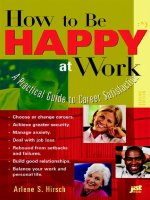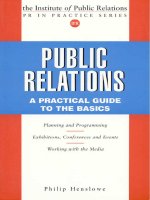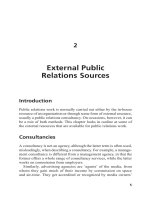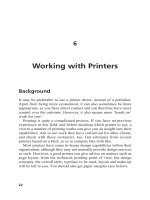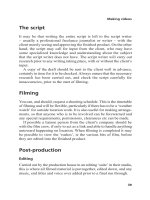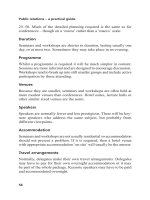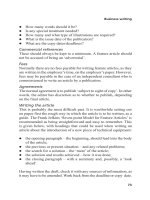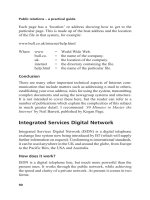How to be happy at work a practical guide to career satisfication (2003)
Bạn đang xem bản rút gọn của tài liệu. Xem và tải ngay bản đầy đủ của tài liệu tại đây (2.42 MB, 305 trang )
Wo r k
Arlene S. Hirsch
SECOND
EDITION
:^)
at
HAPPY
How
to Be
HAPPY
A
P
r
a
c
t
i
c
a
l
G
u
i
d
e
t
o
C
a
r
e
e
r
S
a
t
i
s
f
a
c
t
i
o
n
A
P
r
a
c
t
i
c
a
l
G
u
i
d
e
t
o
C
a
r
e
e
r
S
a
t
i
s
f
a
c
t
i
o
n
America’s Career Publisher
FM 8/1/03 6:44 AM Page i
How to Be Happy at Work, Second Edition
© 2004 by Arlene S. Hirsch
Published by JIST Works, an imprint of JIST Publishing, Inc.
8902 Otis Avenue
Indianapolis, IN 46216-1033
Phone: 1-800-648-JIST Fax: 1-800-JIST-FAX E-mail:
Visit our Web site at www.jist.com for information on JIST, free job search tips, book
chapters, and ordering instructions for our many products!
Quantity discounts are available for JIST books. Please call our Sales Department at
1-800-648-5478 for a free catalog and more information.
Acquisitions and Development Editor: Lori Cates Hand
Interior Designers: designLab, Seattle; Trudy Coler
Page Layout: Trudy Coler
Cover Designer: Nick Anderson
Proofreader: Deb Kincaid
Printed in Canada
07 06 05 04 03 9 8 7 6 5 4 3 2 1
Library of Congress Cataloging-in-Publication Data
Hirsch, Arlene S., 1951-
How to be happy at work : a practical guide to career satisfaction / Arlene S. Hirsch
2nd ed.
p. cm.
Rev. ed. of: Love your work and success will follow. c1996.
Includes index.
ISBN 1-56370-980-5
1. Vocational guidance. 2. Success in business. 3. Job satisfaction. I. Hirsch, Arlene S.,
1951- Love your work and success will follow. II. Title.
HF5381.H516 2004
650.1 dc22 2003017302
All rights reserved. No part of this book may be reproduced in any form or by any means, or
stored in a database or retrieval system, without prior written permission of the publisher
except in the case of brief quotations embodied in articles or reviews. Making copies of any
part of this book for any purpose other than your own personal use is a violation of United
States copyright laws.
We have been careful to provide accurate information in this book, but it is possible that
errors and omissions have been introduced. Please consider this in making any career plans
or other important decisions. Trust your own judgment above all else and in all things.
Trademarks: All brand names and product names used in this book are trade names, service
marks, trademarks, or registered trademarks of their respective owners.
FM 8/14/03 8:33 PM Page ii
iii
About This Book
It’s not easy to tell others how to be happy at work, especially
people who feel as if they’re living in a career combat zone. I
know the battleground well. For the past 20 years, I’ve been a
career counselor, psychotherapist, and corporate outplacement
consultant. In that time, I’ve seen more casualties of the career
wars than most people experience in a lifetime. I know what it
takes to be happy with your work. But I also know there’s no
simple formula to achieve career success and satisfaction.
The workplace is chaotic. If you’re like most people, you proba-
bly feel that you’re living a career nightmare: working harder to
make a living with fewer available resources, more demands on
your time, and lots of disincentives to achievement. Perhaps you
fantasize about chucking the whole scene. Right about now, life
on the golf course, ski slopes, or a sandy beach can look mighty
appealing.
Maybe you just need a good, long vacation. You don’t want to
drop out of the workforce altogether, but you’re hungering for a
new adventure. You want more control over your time and your
destiny. Your rallying cry is More Freedom, Less Office Politics!
This book is for anyone who needs a change in his or her work
life. It can be a change in the kind of work you do, or in how,
when, or where you do it. I’m prepared to show you how to
make your career more deeply fulfilling. To use my advice, how-
ever, you’ll need to set aside your normal modus operandi. I want
you to open your mind to new possibilities.
Some of my ideas might seem strange initially. Please mull them
over carefully before you discard them. Although my tone is,
sometimes, idealistic, I’d categorize myself as a realistic optimist.
You can’t achieve your deepest desires without hope. And I have
never met a really happy cynic.
In what many people call “the real world,” it’s assumed that
financial success is the key ingredient to satisfaction. I question
FM 8/1/03 6:44 AM Page iii
iv
this assumption. Although economic security settles the mind and
can even quiet the soul, money alone can’t create deep career ful-
fillment. To be deeply fulfilled through work, you must integrate
your financial needs and goals with your spiritual desires. I use
the word “spiritual” cautiously, knowing that it’s often equated
with religion. What I have in mind is a more secular spirituality
that doesn’t call forth visions of God in the workplace. Derived
from the Latin word spiritus, which means “breath,” spirituality,
in this sense, refers to those animating life principles that enable
you to feel most completely alive.
When you bring energy, enthusiasm, and passion to your work,
you infuse your livelihood with a vitality that drives away bore-
dom. Add creativity, growth, meaning, and service, and you’ll
find that alienation will disappear, too. By adding depth to your
work, you can soar to greater heights. I often see people who are
successful in conventional terms but otherwise are deeply dissat-
isfied with their careers. If that’s your situation, you might not get
much sympathy from the people around you. Nevertheless, when
work is not a true reflection of your interests, talents, and values,
it can make you very unhappy.
In this way, I am fortunate. My counseling and writing enable me
to express myself in ways that are compatible with the person I
understand myself to be. They challenge me to develop my talents
rather than suppress them. Although I never confuse my job title
with my identity, I do believe there’s a connection between your
occupation and your career fulfillment. To the extent that your
work enables you to develop your talents, express your beliefs,
and engage your interests, it will be satisfying. Conversely, work
that doesn’t fit your skills and personality won’t be rewarding.
Therefore, if you seek career fulfillment, you must always ask
yourself first and foremost: Does my work suit my needs and
ambitions? If the answer is no, you must take steps to remedy
that problem.
When I set out to write this book, it wasn’t my intention to write
a treatise on personal responsibility. But, as the project unfolded,
FM 8/1/03 6:44 AM Page iv
v
it became abundantly clear that too much passivity is a major
obstacle to career satisfaction. Far too many people live their
lives according to societal, parental, or even employer agendas,
instead of thinking through and acting on their own singular
strengths and visions.
To see your way to a more uniquely individual life experience
(and greater vocational satisfaction), you must deprogram your-
self from what others want you to do and expect you to be. In
writing this book, my goal is to start the ball rolling in that direc-
tion.
In part 1, I introduce a number of psychological challenges that
are important to address and resolve on the road to career satis-
faction, including the all-important need to create a personal life
agenda and timetable.
In part 2, I address some of the tough organizational realities that
have evolved over the last decade. At a time when job security has
vanished and organizational restructuring is on nearly every cor-
porate menu, it’s crucial to take more aggressive responsibility for
your short-and long-term career goals. Although it’s difficult to
control your career destiny in today’s environment, which is more
like emotional quicksand than solid ground, it’s still possible to
influence your surroundings and development in healthy ways.
Amid the change and chaos, there are genuine opportunities for
growth and happiness. But the spoils don’t go to the timid or the
passive. You have to assert yourself in the right way to the right
people.
Finally, part 3 continues to pursue the theme of personal respon-
sibility. The chapters in this part explore alternative work styles
and schedules that you can adopt to increase autonomy and
enhance the quality of your life; and build on the twin themes of
interconnection and collaboration.
At the end of each chapter, I’ve included a “Thought-Starter
Worksheet” to set you on the road to healthy introspection.
Please don’t complete these exercises on the Stairmaster. Find
FM 8/1/03 6:44 AM Page v
vi
yourself a quiet place to reflect on your thoughts, experiences,
and desires, and write your answers in the spaces provided.
We’re an action-oriented society: a nation of doers. But when
it comes to career fulfillment, the path to happiness begins
inwardly, with introspection and self-knowledge. Professionally
speaking, I was raised in the world of psychoanalysis, where
there’s a strongly held conviction that all healthy, self-directed
action rests firmly on the foundation of self-knowledge. Knowing
that, you won’t be surprised to discover that my first goal in
this book is to increase your capacity for introspection and
deepen your self-knowledge. That process requires your active
participation.
To be truly happy with your work, you must forge a path that fits
your needs and life goals. No one is going to hand you the per-
fect career on the proverbial “silver platter.” The issue, as psy-
chiatrist Thomas Szasz tells us, is not whether or not you’ve
found yourself; it’s whether or not you’ve taken the time to cre-
ate yourself.
Freud once identified “work” and “love” as the two greatest
sources of human happiness. For me, this book has been a true
labor of love. If it helps you make fulfilling life and work
changes, it will have done its job and I, too, will be well satisfied.
—Arlene S. Hirsch
Dedication
To Nancy Hirsch
FM 8/1/03 6:44 AM Page vi
CONTENTS
Part 1: Career Choice and Success from Graduation
to Retirement and Beyond 1
Chapter 1: Career Choice: What Do You
Want to Be…Now That You’re
Grown Up? 3
Career-Choice Generation Gaps 5
Looking Forward to Career Growth 13
Take a Personal Career Interest Survey 18
Chapter 2: Do You Know the Secrets of Career
Success? 25
Rule 1: Motivation Is the Key to Success 26
Rule 2: Success Takes Hard Work 28
Rule 3: Follow Your Dream 30
Rule 4: Honor Your Talents 34
Rule 5: Manage Yourself 36
Rule 6: Take Calculated Risks 39
Chapter 3: Fail(ure) Is Not a Four-Letter Word 47
The Thrill of Defeat? 49
Common Causes of Career Failure 51
Turning Failures Around 62
FM 8/1/03 6:44 AM Page vii
viii
CONTENTS
Chapter 4: Oh No, 50!: Midlife Career Transitions 69
Are You Just Waiting for a Pension? 71
A New Phase of Life 72
Managing Late Career Change 80
Limitless Potential 83
Part 2: Career Security 93
Chapter 5: Achieving Career Security in
Turbulent Times 95
Do Good Work 96
Develop Marketable Skills 97
Be Willing to Pitch In 99
Expect the Unexpected 99
Develop an Innovative Spirit 101
Learn to Manage Risk 101
Know How to Job Hunt 103
Feed Your Rolodex 105
Chapter 6: How to Love the Job You Hate 113
Strategy 1: Stop Watching the Clock 114
Strategy 2: Learn to Take a Compliment 115
Strategy 3: Pat Yourself on the Back (Occasionally) 116
Strategy 4: Take Criticism for What It’s Worth 118
Strategy 5: View Politics as a Challenge 119
Strategy 6: Build Positive Relationships 123
Strategy 7: Stay Positive 125
Strategy 8: Take Responsibility for Your Own
Happiness 125
Strategy 9: Don’t Confuse Your Job with Your Life 127
Strategy 10: Have a Plan to Get Out 128
FM 8/1/03 6:44 AM Page viii
ix
CONTENTS
Chapter 7: Layoff Survivors’ Dilemma:
Put Up or Shut Up 133
Anxiety Rules 134
Get in Touch with Your Emotions 135
Devise New Solutions 137
Make a Commitment to Be Part of the Solution 140
Attitude Is a Key Variable 141
View This as a Learning Opportunity 142
Don’t Let Others Hold You Back 144
Be Prepared to Walk Away 146
Chapter 8: Quitting Your Job 153
The Lies We Tell Ourselves 154
Timing Your Departure 160
An Emotional Journey 162
Saying Farewell 163
Part 3: The Path to Career Happiness 171
Chapter 9: Business Ethics: What’s Your
Bottom Line? 173
An FBI Agent Stands Up for Her Principles 175
A Lack of Ethics 176
The Argument for Business Ethics 178
When Co-Workers Do Wrong 180
There’s Strength in Numbers 182
Fight Subtle Pressures 183
Find a Role Model 185
Defend Your Rights 186
Reshape the World 187
Trust Your Inner Strength 188
FM 8/1/03 6:44 AM Page ix
x
CONTENTS
Chapter 10: Work/Life Balance: Making a
Life While Making a Living 197
Take a Break 199
Thinking of a Permanent Vacation? 201
Starting a Whole New Life 203
Less Is More? 205
Moving Someplace Else Isn’t Always the Answer 207
Alternative Work Arrangements 209
Pay Attention to Yourself 213
Start on the Right Foot 215
Chapter 11: Having Fun at Work 221
Laughter Really Is the Best Medicine 222
Laugh in the Face of Fear 224
Finding Everyday Fun 224
From Play to Success 227
What Delights You? 231
Take on a New Adventure 233
Improve Your Social Life 234
Chapter 12: We, Inc.: Working with Others
or Starting Your Own Business 243
Managing Your Boss 243
Finding a Mentor 247
Starting Your Own Business 251
Appendix: Your Career Happiness Plan 263
Index 289
FM 8/1/03 6:44 AM Page x
1
PART 1
Career Choice and Success from
Graduation to Retirement and
Beyond
Chapter 1: Career Choice: What Do You Want to Be…Now
That You’re Grown Up?
Chapter 2: Do You Know the Secrets of Career Success?
Chapter 3: Fail(ure) Is Not a Four-Letter Word
Chapter 4: Oh, No, 50!: Midlife Career Transitions
FM 8/1/03 6:44 AM Page 1
FM 8/1/03 6:44 AM Page 2
3
Career Choice:What Do You
Want to Be…Now That You’re
Grown Up?
“How old do you have to be before you feel like a grown-up in your own
head?”
—Bob Greene
I
t was Monday morning, and my week wasn’t
getting off to a great start. Stuck in traffic on
the Kennedy Expressway, I was already late
for my first appointment with a corporate client. As I fiddled with the
radio looking for a traffic report, a commercial caught my attention:
“Allison, do you want to be a ballerina when you grow up?” a man
asked.
“Please, Daddy,” a tiny voice replied. “I’m only three. I’m not plan-
ning to make any career decisions until I’m six.”
I don’t remember the product they were advertising (what could it pos-
sibly be?). But that clever two-line dialogue is permanently etched in
my memory, reminding me of how much we are encouraged—and
how much we encourage others—to define ourselves by our work.
Kids’ fantasies often reflect their television worlds. When I was grow-
ing up, there weren’t many celebrity role models for girls; and the ones
that existed had helpmate or sidekick roles. There were Lois Lane,
CHAPTER 1
CH01 8/1/03 6:26 AM Page 3
4
:^) CHAPTER 1
Lucille Ball, Dale Evans, or June Cleaver from which to choose. To
me, the most interesting possibilities were Annie Oakley, a hard-riding
tomboy with pigtails, and Matt Dillon’s worldly saloon-keeper com-
panion, Miss Kitty.
But I didn’t live in the wild, Wild West. I lived in Skokie, Illinois,
where the mode of transportation was more likely to be a Chevy
Impala than a horse named Bullet. Most of the women I knew really
did aspire to be the suburban-perfect June Cleaver (as opposed to
Barbara Billingsley, the actress who portrayed her). In those prefemi-
nist days, real-life women who worked outside the home were routed
into professions or jobs that capitalized on nurturing and caretaking
roles such as nursing, teaching, social work, and secretarial jobs.
Although similarly constricted, the boys had a range of more adven-
turous fantasy choices. They could be Superman or Batman, the Lone
Ranger or Zorro, or any one of a million athletes. My brother, who
played baseball throughout grammar school, high school, and college,
had dreams of being the next Mickey Mantle or Roger Maris or Willie
Mays. Even their “realistic” choices looked more glamorous.
Ambitious boys aspired to be doctors, lawyers, or businessmen—
professions that would net them wealth, power, prestige, and
recognition.
It wasn’t until the sixties—when feminism and technology
converged—that new dreams and possibilities opened up to and for
women. Today we are just as likely to expect and want our daughters
to be doctors, lawyers, and businesswomen. Young girls today still
dream of becoming ballerinas or horsewomen. But they are equally
enamored of becoming the next Britney Spears, Ally McBeal, or
basketball star Cynthia Cooper.
Boys’ fantasies haven’t changed nearly as much. Young boys still
dream of becoming the next superhero or superathlete. What has
changed is that now they have to compete with the girls for the top
spots.
CH01 8/1/03 6:26 AM Page 4
5
CAREER CHOICE :^)
Career-Choice Generation Gaps
Every generation has its collective values and beliefs. Depression-era
parents passed their values for financial security, wealth, and status
onto their baby-boomer children. The baby-boomer generation was
the first group to collectively espouse the importance of career satis-
faction along with success. When baby boomers began to discover
career success was rewarding but not necessarily satisfying, they began
to reexamine the values and beliefs they had internalized from their
parents. They also began to pass along new messages to their own
children. Interestingly, the children of baby-boomer parents are likely
to complain that their parents were too open-minded or didn’t provide
them with enough direction.
“My parents told me that I could be anything that I wanted to be,”
says Leslie, a 22-year-old graduate student in psychology. “My prob-
lem is that I don’t have any idea what I want to be.”
Her situation is eerily reminiscent of the one that Lily Tomlin’s char-
acter confronts in The Search for Signs of Intelligent Life in the
Universe when she comments: “I always wanted to be somebody, but
I should have been more specific.”
When it comes to choosing your life’s work—or any work at all—you
are choosing a work role, and not self definition. You are not what
you do. You are what you are. Your identity is comprised of your
character, your values, your personality, and the many roles you play
in life. You are not only a doctor or a lawyer. You are also a husband
or a wife, a son or a daughter, a parent, a friend, a colleague. This is
an important message to keep in mind when you want to choose or
change careers.
Choosing a career often involves a journey of self-discovery. Lisa was
a second-year law student when she came to me for career advice. She
knew that she didn’t like law or want to be a lawyer, but she worried
about what other people would say if she dropped out of law school
to pursue her real passion—to become a television news producer.
CH01 8/1/03 6:26 AM Page 5
6
:^) CHAPTER 1
This was her childhood dream and her adult passion; but she worried
about choosing such a competitive field.
She was facing a tough choice. Broadcast journalism is one of the most
intensely competitive career choices. On the other hand, she had an
undergraduate degree in journalism from a prestigious college. She
was willing and able to go to graduate school in broadcast journalism
to secure an educational base for her career dream. Because she was
still in law school, she had not yet acquired a lavish lifestyle. She could
afford to take the risk. But there was no guarantee that she would suc-
ceed.
To help her make that decision, we toyed with a larger perspective. I
asked her to project herself 10 years into the future. How would she
feel if she was working as a lawyer? How would she feel if she had not
been successful in broadcast journalism?
The answers to these questions helped her get unstuck because she
realized that, even if she succeeded in law, she would always question
whether she could have been successful in a field she felt passionate
about. Once she made a decision to take a leave of absence from law
school, she was surprised at how supportive her family and friends
were of her decision, and how helpful they were in connecting her up
with people who worked in the television business. Although Lisa is
still nervous about her future, she is so energetic and passionate about
the work that others find her enthusiasm contagious. If Emerson was
right that “nothing great was ever achieved without enthusiasm,” she
is definitely on the road to greatness.
The Hansel and Gretel Theory of Career
Discovery
To uncover your career dream, my friend and colleague Cheryl Heisler
recommends what she calls “the Hansel and Gretel approach.” To
find your way back to your original career dream, she says, you have
to look for clues in the crumbs that you’ve abandoned along the way.
Search your past for discarded interests, dreams, and goals. You might
be surprised to find them still awake inside you.
CH01 8/1/03 6:26 AM Page 6
7
CAREER CHOICE :^)
Heisler knows firsthand the value of such a journey of self-discovery.
Originally, she chose law because her father, a pharmacist, though it
would be a good field for a bright, creative, articulate woman such as
his daughter (she’d been voted “Friendliest Person” of her senior high
school class). But the law isn’t always the friendliest profession. It’s
filled with conflict and adversarial relationships. It took Heisler only
a few years of practicing law to figure out that it wasn’t the right
choice for her.
As she looked for clues to her next career choice, she reflected back on
her college major, which was advertising. She decided to pursue a
position in marketing—advertising’s first cousin—and subsequently
landed a brand-management job at Kraft Foods.
If brand management wasn’t her ultimate calling, it did prove to be a
good outlet for her creativity (which made her good at positioning
new products) and her outgoing personality (which made her excellent
at client relationships). Along the way, she also discovered that career
choice is not always a one-time experience. The more she learned
about herself and the job market, the better she was able to under-
stand how to make good choices. When she realized that product
management involved too much number-crunching (for a woman who
never liked math), she found herself once again on the lookout for
new options.
As it turns out, she didn’t have to search hard for her next career
direction. Essentially, it came to her in the form of other attorneys
who had heard about her career change and wanted to ask her advice
on how they could change careers, too. When she discovered how
much demand there was for such information and how much she
enjoyed counseling other lawyers, she founded Lawternatives, a
career-consulting firm that counsels lawyers about career-change
options.
For Heisler, the hardest part of becoming a career counselor was giv-
ing up the job title of “lawyer.” Even as a brand manager for Kraft,
she referred to herself as a “lawyer who was doing marketing.” She
CH01 8/1/03 6:26 AM Page 7
8
:^) CHAPTER 1
began to realize how much of her identity was vested in her job title.
It was only as she grew to love her counseling business that she was
able to relinquish the lawyer title.
“I have a job where I can be myself and be appreciated,” says Heisler.
“What better title can I wear?”
Hand-Me-Down Dreams
Cheryl Heisler looked backwards (to her career choice history) first,
in order to move forward with a new dream. In addition to reclaim-
ing a lapsed interest, she also needed to revisit her father’s career
advice, in order to take more personal responsibility for her choices.
Her journey reminds us that the process of self-discovery is also a sep-
aration process. You can’t go forward without looking backward. You
must understand how family dynamics and expectations influenced
(and continued to influence) your career choices and development, in
order to liberate yourself from unconscious conflicts and motivations.
This is not an indictment of your parents or your childhood. Every
parent has unfulfilled dreams, wishes, and needs, which children often
intuit as an unspoken demand. A father whose dream of becoming a
professional baseball player was thwarted pushes his son too hard to
win. A mother who regrets dropping out of law school to get married
and have kids makes no secret of how gratified she is by her daugh-
ter’s career decision to become a lawyer. Later, both the mother and
the daughter are profoundly disappointed when the daughter finds
herself temperamentally ill-suited to the profession.
In another (real-life) scenario, Richard fulfilled his father’s aborted
dream to become a lawyer. Richard’s father had flunked out of law
school in his twenties. He went into the construction business and the
bar business, and ultimately owned a restaurant. But Richard’s father
never forgot his first dream.
When Richard, his firstborn son, decided to go to law school to
become a lawyer, his father was thrilled with his son’s decision and
CH01 8/1/03 6:26 AM Page 8
9
CAREER CHOICE :^)
forever after lived vicariously through his son’s many career achieve-
ments. Fortunately, Richard liked and was well-suited to the law. This
was not true for his younger brother, David, an equally talented and
ambitious young man who made a name for himself in the field of
medicine. Despite David’s equally impressive career achievements, his
father never showed the same interest or pride in David’s career. His
dad simply couldn’t relate to his son’s ambitions or accomplishments.
As kids, we use our parents like mirrors. We solicit their advice,
observe their choices, and respond to their expectations. It can take a
lifetime to realize that your parents’ advice might have been bad
advice (or, at least, bad for you). Part of growing up is recognizing that
your parents don’t have all the answers. To find your way to a more
fulfilling work life, you might have to unlearn some of that flawed
advice you got from your mom and dad.
Eleanor Roosevelt was right when she said, “You can’t live anyone
else’s life—not even your child’s.” Why, then, do so many parents feel
compelled to present their kids with ready-made answers to Life’s
Tough Questions rather than help them develop the experience, self-
knowledge, and self-confidence to create their own solutions?
Although parents do have a responsibility to instill good values, much
of what parades as the “right thing to do” can relate more to parental
narcissism than any objective standard of correctness. Too many par-
ents push their own personal dream of success and call it reality.
Lauren was a 28-year-old accountant who came to see me because she
was bored to tears by her career and wanted to do something more
creative. A closer examination of her career history revealed that she
had chosen accounting because her accountant-father told her it was
a “good profession.” She trusted his wisdom and followed his advice,
only to discover that it was all wrong for her.
When she went back to her father to ask him why he thought account-
ing was a good profession when she found it so boring, he replied: “I
said it was a good profession. I never said it was interesting.”
CH01 8/1/03 6:26 AM Page 9
10
:^) CHAPTER 1
Too late, Lauren realized her mistake. When she said she wanted a
good profession, she meant that she wanted an interesting profession.
Her father was working with a different mindset. To him, a good pro-
fession was one where he could make a lot of money and support his
family’s lifestyle. Once she realized her own needs for more interesting
and creative work, Lauren went back to school and became an interi-
or designer, a field which she finds more creatively stimulating.
My career counseling practice is filled with stories like this: young
men and women who followed their parents’ career advice, only to
discover that it made them unhappy. Much of the time, the parents
assumed that a well-paying job would make their kids happy. What
their offspring are discovering is that “making money” is a necessary
condition for career success and satisfaction; but it is not sufficient.
You need to make money at work that is meaningful to you.
When I was growing up, my parents shared a dream for my brother
to become either an accountant or a tax attorney. This reflected their
Depression-era dreams for financial stability and comfort. My broth-
er’s needs and dreams were different. He valued creativity and intel-
lect above all else, which is why he chose to become a writer and an
English professor. My parents worried obsessively that he would
“starve.” But they underestimated their son’s intellectual talents, as
well as his enormous competitive drive to succeed. Had he followed
their advice and become a tax attorney, he would undoubtedly have
failed miserably for several reasons. He is not skilled in mathematics;
he has no interest in tax or law; making money is important to him,
but it has never been his first priority. He would have found the work
and the environment intellectually and creatively boring. His passion
for his work—and particularly his love of literature and poetry—has
fueled much of his success.
There Are No Perfect Career Choices
There is no one right answer to the question “what do you want to be
when you grow up?” Nor is there any cookie-cutter formula for suc-
cess. Good choices are individual choices. They are based on an
CH01 8/1/03 6:26 AM Page 10
11
CAREER CHOICE :^)
understanding of how to interweave your individual interests, abili-
ties, values, and personality with the job market. Some of the best
career paths are ones that you create for yourself based on your tal-
ents and the world’s needs.
Part of growing up, it seems, means figuring out that your parents
don’t have all the answers, even if they think they do. In a wonderful
episode from The Wonder Years, the television series about a baby
boomer nostalgically reliving his years of innocence, 12-year-old
Kevin Arnold goes to work with his normally gruff and unapproach-
able father one day. The encounter turns into an important “coming-
of-age” experience.
Dressed in matching suits and ties, the two male Arnolds are greeted
by a small staff of fawning employees who pinch Kevin’s cheeks and
ask him what he wants to be when he grows up. Inside his father’s
office, Kevin is astounded and impressed by the “grown-up toys” he
sees everywhere—but especially his father’s Big Desk and Giant Chair.
His father is immediately bombarded with emergency phone calls and
people crises. As he adroitly handles them one by one, Kevin leans
back in the Giant Chair and props his feet up on the Big Desk, watch-
ing the action and fantasizing about “how great it must be to have
power.”
A rare moment of father-son intimacy ensues a few minutes later
when, in the cafeteria, Kevin asks his father: “Did you always want to
be the Manager of Distribution Support and Product Services?” His
father laughs, telling his son, “When I was your age, I wanted to be
captain of a big ship with a big mast. Be on the ocean. Navigate by the
stars.”
When asked about what happened to his dream, Mr. Arnold describes
how he generally settled into adult responsibilities. He claims no
regret about the lost dreams of youth. “You can’t do every silly thing
you want in life,” he tells his son. Back at the office, Kevin’s dad is
accosted by his boss and chewed out for not taking his phone calls. As
Kevin looks on, the Big Boss threatens to fire his father if he ever
CH01 8/1/03 6:26 AM Page 11
12
:^) CHAPTER 1
makes that mistake again. Mr. Arnold never says a word in his own
defense.
Later that night, father and son stand outside gazing upward at the
stars, pondering the day’s events. As his father searches the sky for
Polaris, Kevin realizes that he, too, has lost something. His father
doesn’t scare him anymore.
I wish that my client “Claudia” had learned that same lesson before
she relinquished her childhood dream of becoming a “singer, actress,
or teacher” to follow her father’s dictate that she go to medical school
and become a doctor. Her father, who was a health-care administra-
tor, always wanted to be a doctor. But, as a (pre–civil rights) African-
American male, he encountered too much racial discrimination to
pursue his dream. He was determined that his children would have the
advantages and rights that he had never had.
By her own admission, Claudia never had the courage to defy her
father; but she never wanted to be a doctor, either. She assumed that
he knew best and now, at 35 years old, she is paying the price for that
misguided belief. “I’m living my father’s dream,” she says, “and it’s
making me miserable.”
The real problem with parents who foist their personal preferences
onto their children isn’t so much whether the parent is right or wrong,
but that the parent is taking over a decision that isn’t theirs to make.
As a child, you might not feel free to choose; but as an adult, you are.
The road to adulthood is paved with renunciation. But whether that
renunciation takes the form of giving up your personal dream (as
Kevin’s father did), or giving up the belief that your parents are omnis-
cient and omnipotent (as Kevin did), is up to you. What is clear is that,
as an adult, you have a responsibility to forge your own reality and
make your own choices. It’s up to you how much you want to risk and
how much you want to compromise.
To this day, Claudia regrets that she did not pursue her dream of
becoming a singer. Although she knows that it would have been risky,
CH01 8/1/03 6:26 AM Page 12
13
CAREER CHOICE :^)
she also wonders whether she could have been successful at it, if she
had focused all of her energy and attention on that goal. With so many
student loans to repay, she feels increasingly trapped by her financial
responsibilities, even though she makes a good living as a physician.
What many people (of all ages) fail to realize is how important it is to
like and care about the work you do—to do work you love and love
the work you do. Tom Peters, a noted author and management con-
sultant, has said that when it comes to career choices, it’s inconceiv-
able to him that ambitious and talented people would do anything
other than follow their hearts toward things they love. How can you
possibly expect to be successful, Peters asks, if you don’t care about
and value the work you do?
Looking Forward to Career Growth
The Hansel and Gretel strategy requires some 20/20 hindsight. It
involves learning from your mistakes and redirecting your path
toward more rewarding and fulfilling choices. But there is also a part
of you that needs to go exploring, to learn about career fields and
choices to which you might not yet have gained exposure.
There might be 26,000 occupations in the labor force, but most peo-
ple tend to focus their attention on a handful of possibilities. Rather
than limit yourself to specific job titles (which can often be mislead-
ing), try focusing on what career consultant Bernard Haldane called
“motivated skills.” A motivated skill is something that you like to do,
and do well. That’s how an insurance claims manager who likes proj-
ect management and writing became a technical writer, a CPA with a
passion for New Age health care became a spa manager, and a systems
engineer with an innate talent for foreign languages positioned
herself as an international expert in telecommunications. Instead of
focusing on job titles, these successful career changers did some “soul-
searching” to figure out what they were really good at and loved to
do. Then they positioned themselves accordingly.
CH01 8/1/03 6:26 AM Page 13
14
:^) CHAPTER 1
There are also career changers whose primary motivation is to keep
on growing and learning. What they want is variety, challenge, and
intellectual stimulation. These are people who should expect to
change careers voluntarily several times over the course of their work-
ing lives because they will always need a new challenge. To become
too closely identified with a job title or career identity would be
severely self-limiting.
This is how (and why) a test engineer became an engineering manag-
er, a management consultant, an entrepreneur, and finally, a professor.
At each transition point in his career path, he determined what he
needed to do in order to stay stimulated and energized—and then
committed himself to doing it.
Changing Careers—The New Norm
The days of choosing one career for life are long gone. Perhaps they
should never have existed at all. Isn’t it unrealistic to think that the
career choice you made at 20 should automatically suit your needs at
30, 40, 50, or 60? If your first career choice doesn’t work out the way
you once hoped it would, there’s no reason why you can’t continue to
make new choices that better suit your needs. My oldest career-change
client was age 70 when she decided to retire from medicine and pur-
sue a law degree. (She then became a medical-legal consultant to a
medical products manufacturer.)
Somewhere along the line you might have picked up the mistaken idea
that the need for growth stops in adulthood. But it is only people with
limited career ambitions or those who “learned everything they need-
ed to know in kindergarten” who can expect to roll gracefully into
retirement without changing one iota.
To lead a fulfilling life, you need to keep challenging yourself to grow
at every stage in your life. Frank Mackey exemplifies that philosophy.
Mackey retired from a successful law practice in Little Rock,
Arkansas, (in his sixties) to pursue an acting career in Chicago. Later
he moved on to New York City. This isn’t his first career change. His
CH01 8/1/03 6:26 AM Page 14

